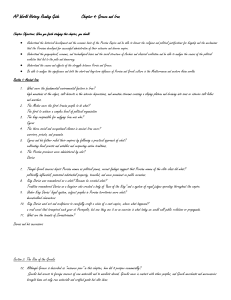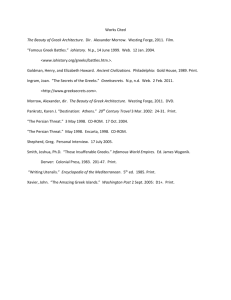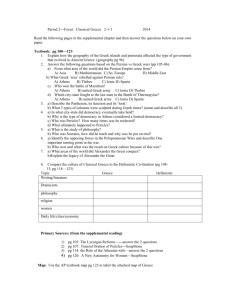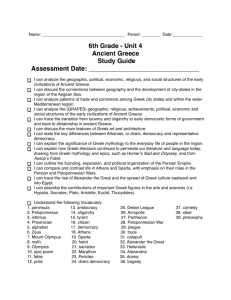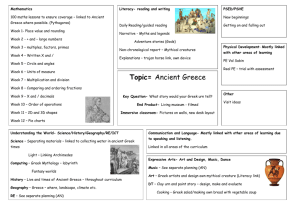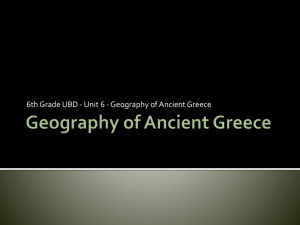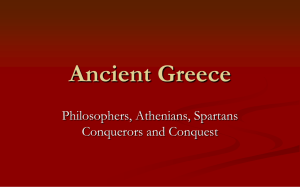AP World History - Mr. Mulford Chapter 4
advertisement
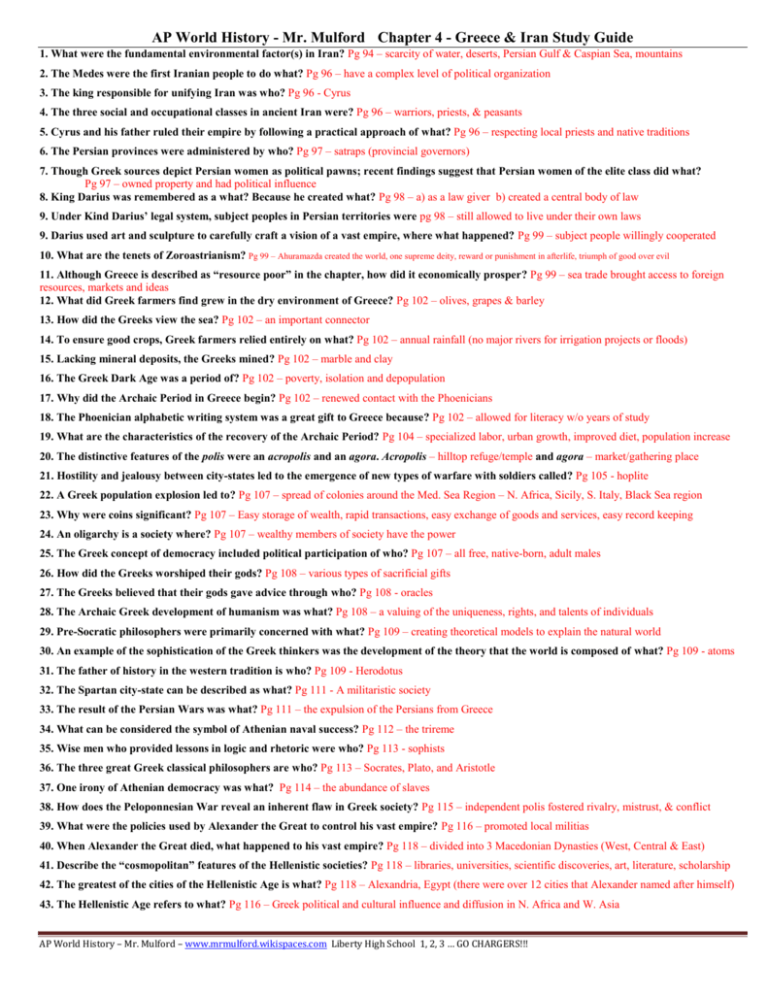
AP World History - Mr. Mulford Chapter 4 - Greece & Iran Study Guide 1. What were the fundamental environmental factor(s) in Iran? Pg 94 – scarcity of water, deserts, Persian Gulf & Caspian Sea, mountains 2. The Medes were the first Iranian people to do what? Pg 96 – have a complex level of political organization 3. The king responsible for unifying Iran was who? Pg 96 - Cyrus 4. The three social and occupational classes in ancient Iran were? Pg 96 – warriors, priests, & peasants 5. Cyrus and his father ruled their empire by following a practical approach of what? Pg 96 – respecting local priests and native traditions 6. The Persian provinces were administered by who? Pg 97 – satraps (provincial governors) 7. Though Greek sources depict Persian women as political pawns; recent findings suggest that Persian women of the elite class did what? Pg 97 – owned property and had political influence 8. King Darius was remembered as a what? Because he created what? Pg 98 – a) as a law giver b) created a central body of law 9. Under Kind Darius’ legal system, subject peoples in Persian territories were pg 98 – still allowed to live under their own laws 9. Darius used art and sculpture to carefully craft a vision of a vast empire, where what happened? Pg 99 – subject people willingly cooperated 10. What are the tenets of Zoroastrianism? Pg 99 – Ahuramazda created the world, one supreme deity, reward or punishment in afterlife, triumph of good over evil 11. Although Greece is described as “resource poor” in the chapter, how did it economically prosper? Pg 99 – sea trade brought access to foreign resources, markets and ideas 12. What did Greek farmers find grew in the dry environment of Greece? Pg 102 – olives, grapes & barley 13. How did the Greeks view the sea? Pg 102 – an important connector 14. To ensure good crops, Greek farmers relied entirely on what? Pg 102 – annual rainfall (no major rivers for irrigation projects or floods) 15. Lacking mineral deposits, the Greeks mined? Pg 102 – marble and clay 16. The Greek Dark Age was a period of? Pg 102 – poverty, isolation and depopulation 17. Why did the Archaic Period in Greece begin? Pg 102 – renewed contact with the Phoenicians 18. The Phoenician alphabetic writing system was a great gift to Greece because? Pg 102 – allowed for literacy w/o years of study 19. What are the characteristics of the recovery of the Archaic Period? Pg 104 – specialized labor, urban growth, improved diet, population increase 20. The distinctive features of the polis were an acropolis and an agora. Acropolis – hilltop refuge/temple and agora – market/gathering place 21. Hostility and jealousy between city-states led to the emergence of new types of warfare with soldiers called? Pg 105 - hoplite 22. A Greek population explosion led to? Pg 107 – spread of colonies around the Med. Sea Region – N. Africa, Sicily, S. Italy, Black Sea region 23. Why were coins significant? Pg 107 – Easy storage of wealth, rapid transactions, easy exchange of goods and services, easy record keeping 24. An oligarchy is a society where? Pg 107 – wealthy members of society have the power 25. The Greek concept of democracy included political participation of who? Pg 107 – all free, native-born, adult males 26. How did the Greeks worshiped their gods? Pg 108 – various types of sacrificial gifts 27. The Greeks believed that their gods gave advice through who? Pg 108 - oracles 28. The Archaic Greek development of humanism was what? Pg 108 – a valuing of the uniqueness, rights, and talents of individuals 29. Pre-Socratic philosophers were primarily concerned with what? Pg 109 – creating theoretical models to explain the natural world 30. An example of the sophistication of the Greek thinkers was the development of the theory that the world is composed of what? Pg 109 - atoms 31. The father of history in the western tradition is who? Pg 109 - Herodotus 32. The Spartan city-state can be described as what? Pg 111 - A militaristic society 33. The result of the Persian Wars was what? Pg 111 – the expulsion of the Persians from Greece 34. What can be considered the symbol of Athenian naval success? Pg 112 – the trireme 35. Wise men who provided lessons in logic and rhetoric were who? Pg 113 - sophists 36. The three great Greek classical philosophers are who? Pg 113 – Socrates, Plato, and Aristotle 37. One irony of Athenian democracy was what? Pg 114 – the abundance of slaves 38. How does the Peloponnesian War reveal an inherent flaw in Greek society? Pg 115 – independent polis fostered rivalry, mistrust, & conflict 39. What were the policies used by Alexander the Great to control his vast empire? Pg 116 – promoted local militias 40. When Alexander the Great died, what happened to his vast empire? Pg 118 – divided into 3 Macedonian Dynasties (West, Central & East) 41. Describe the “cosmopolitan” features of the Hellenistic societies? Pg 118 – libraries, universities, scientific discoveries, art, literature, scholarship 42. The greatest of the cities of the Hellenistic Age is what? Pg 118 – Alexandria, Egypt (there were over 12 cities that Alexander named after himself) 43. The Hellenistic Age refers to what? Pg 116 – Greek political and cultural influence and diffusion in N. Africa and W. Asia AP World History – Mr. Mulford – www.mrmulford.wikispaces.com Liberty High School 1, 2, 3 … GO CHARGERS!!!

